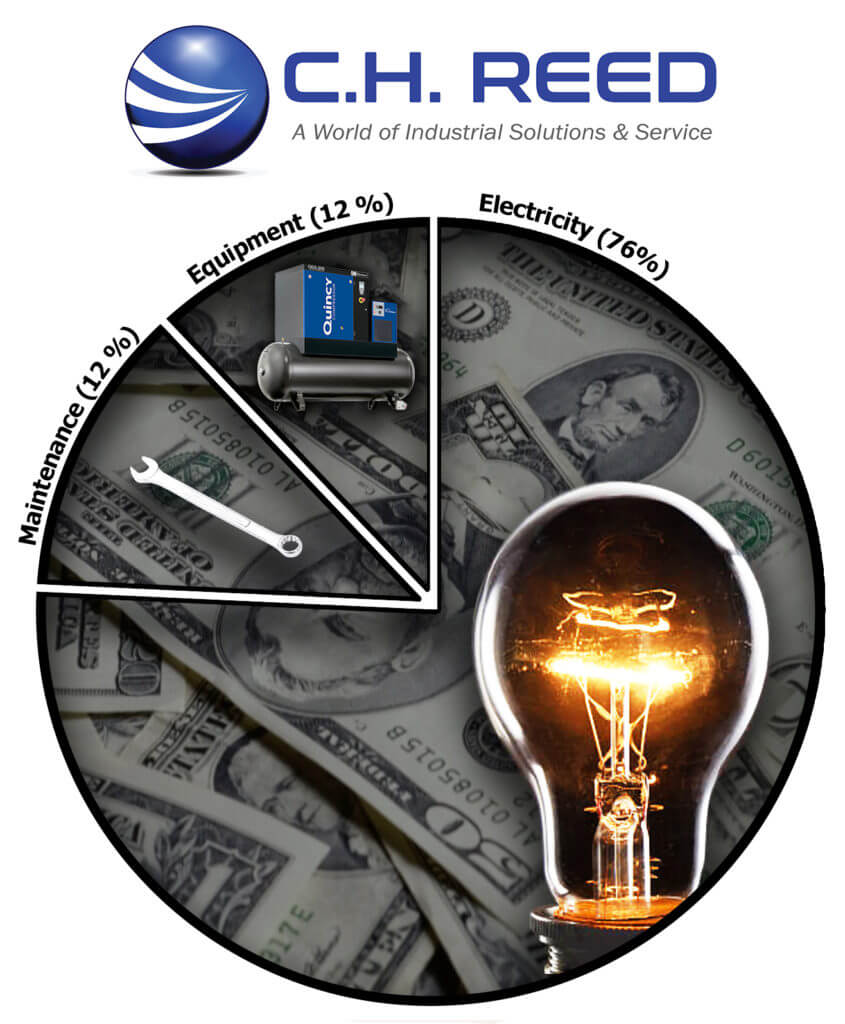March 30, 2021
Total Life Cycle Cost of a Compressed Air System
SHARE THIS POST
If you’re in the market for a new compressed air system, perhaps the most important thing that you should understand is the difference between price and cost. That is, the upfront purchase price of the unit vs. the total lifecycle cost of the system.
Compressed air is an essential part of production throughout many industries around the world. It’s so important in the production of products that many companies consider compressed air an actual utility; like electricity, natural gas, or water. A lot of businesses, however, don’t always understand the true total life cycle cost of a compressed air system or the true cost of producing compressed air. A single plant can easily spend tens of thousands of dollars annually generating compressed air, with nearly half of it going to waste.
Contrary to common assumptions, most of the cost of compressed air isn’t in the initial purchase price of the compressed air system, but in the electricity it takes to operate the equipment over time. A general rule of thumb when calculating the true life cycle cost of a compressed air system is shown in the chart below:

Formula to Calculate the Cost of Compressed Air in Your Plant
There are a few key elements you need to know to calculate the annual energy requirements of your compressed air system:
(bhp) x (0.746) x (operating hours) x ($/kWh) x (% time) x (% full-load bhp)
Motor Efficiency
- bhp (Brake Horsepower): The measure of a motor’s HP before the loss in power caused by other auxiliary components. This is frequently higher than the motor nameplate HP.
- Multiply bhp by 0.746: This converts HP to kilowatt (kW).
- Hours of Operation: Number of annual operating hours.
- kWh (Kilowatt Hour): When calculating, use the current cost of energy from your local power supplier.
- Percent Time: The percentage of time running at a certain operating level.
- Percent Full-Load bhp: bhp as a percentage of full-load bhp at this operating level.
- Motor Efficiency: The operating efficiency of the motor, usually found on the nameplate.
Take this example from the Department of Energy; a manufacturing plant’s compressor has a 200 HP motor (which requires 215 bhp). The compressor operates 6,800 hours annually. It is fully loaded 85% of the time (motor efficiency = 95%) and unloaded the rest of the time (25% full-load bhp and motor efficiency = 90%). The aggregate electric rate in this example is $0.05 / kWh.
(215 bhp) x (0.746) x (6,800 hours) x ($0.05 kWh) x (0.85) x (1.0)
0.95
Cost when fully loaded = $48,792
(215 bhp) x (0.746) x (6,800 hours) x ($0.05 kWh) x (0.15) x (0.25)
0.90
Cost when partially loaded = $2,272
Annual Energy Cost = $48,792 + $2,272 = $51,064
What Can a Compressed Air System Analysis Do for You?
A compressed air system analysis or “air audit” can help you identify crucial productivity and quality improvements that can help you lower your compressor’s operating costs. As stated earlier, compressed air is often wasted in many ways. According to the US Department of Energy, leaks can account for 25-30% of wasted air, artificial demand 10-15%, inappropriate uses 5-10%, and production inefficiencies nearly 50%. A leak detection survey or an air audit from C.H. Reed will provide a baseline of how your current air compressor is operating and can help identify the hidden costs in your system.
To learn more about the total life cycle cost of your compressed air system, contact us today to speak with a compressed air system specialist in your area.
Search
Categories
Get a consultation
Related Posts
The 3 Distinct Advantages of Hydraulic Powered Pumps
Recently, C. H. Reed helped a major printing operation install a new ink pumping system. The new system needed to transfer four colors of high viscosity, heat-set ink to their three presses, drawing the ink from multiple 5,000…
Simple Ways to Reduce Waste in Your Spray Finishing System
In today’s demanding manufacturing landscape, it can be convenient to adopt a “cut-costs-at-all-costs” mentality, justifying questionable means for the sake of leaner production, a lower bottom line and increased profitability. Regrettably, those efforts can interfere…
What You Need to Know About Air-Powered Pressure Washers
Pressure washers are great solutions for your average cleaning applications, but what tool do you turn to for your more challenging applications? There are many instances where it is simply impossible to use a traditional…